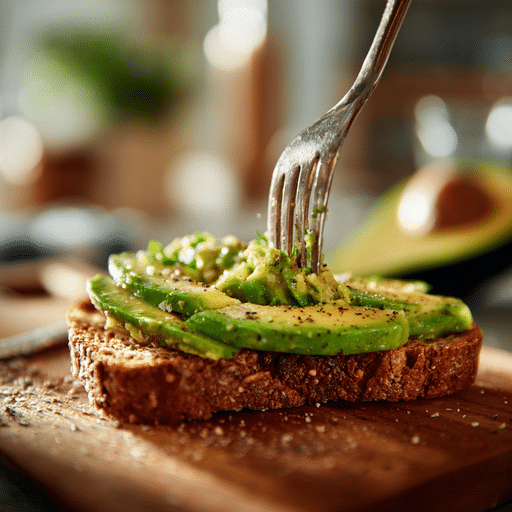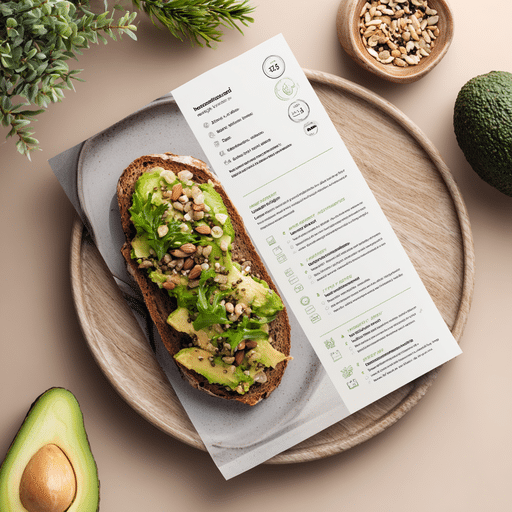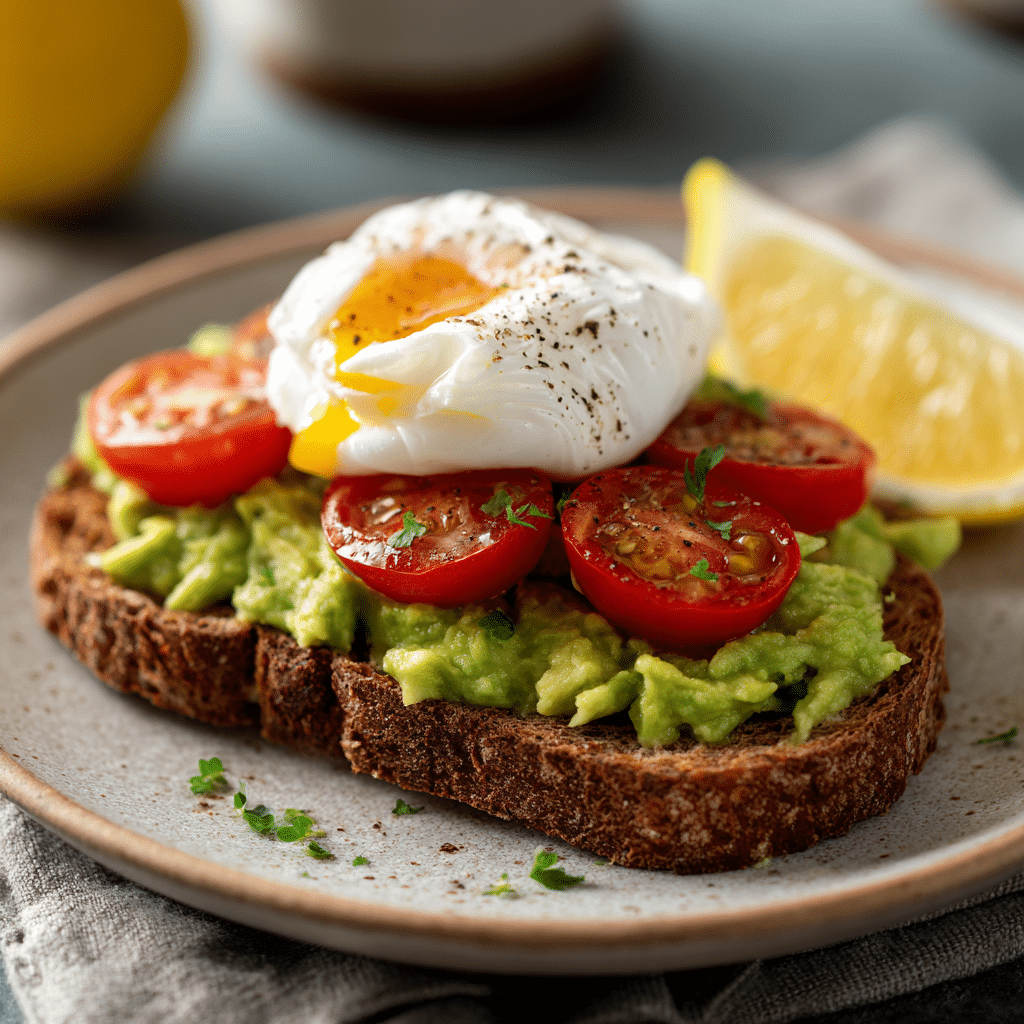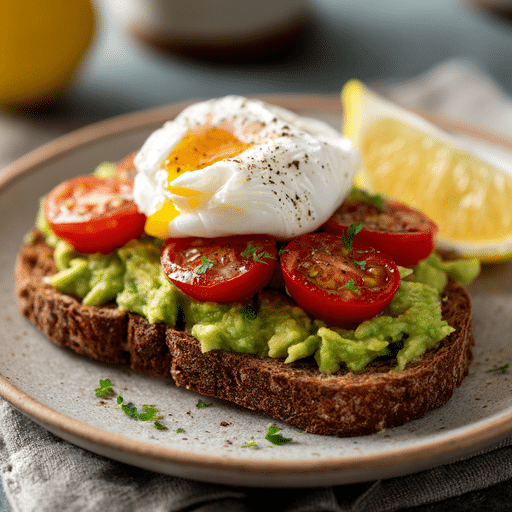Introduction:
Avocado on toast nutrition is often discussed for its delicious taste and impressive health benefits. This popular dish, loved by many, is not only tasty but also packed with essential nutrients that can fuel your body in a nutritious way. From healthy fats to fiber and important vitamins, avocado on toast is more than just a quick meal—it’s a healthy choice for breakfast, lunch, or a snack. In this article, we’ll dive deep into the avocado on toast nutrition facts, how it supports a balanced diet, and ways to customize this meal for even more benefits.
The Nutritional Breakdown of Avocado on Toast
Avocado on toast nutrition is more than just a trendy topic—it represents a smart, nutrient-dense choice for everyday eating. Whether you enjoy it as breakfast, a post-workout snack, or a light lunch, this simple dish offers a well-balanced mix of healthy fats, complex carbs, fiber, and essential vitamins. The beauty of avocado toast lies in its versatility, but its baseline nutrition is consistently impressive.
Avocado on toast nutrition begins with calories. A single serving—typically one slice of whole grain bread topped with half a medium avocado—delivers approximately 200 to 300 calories. It’s enough to provide lasting energy without going overboard, making it ideal for anyone mindful of their intake. The toast contributes energizing carbohydrates, while the avocado brings in rich, satisfying fat.
One of the major highlights of avocado on toast nutrition is its fat profile. Avocados contain mostly monounsaturated fats, which are heart-healthy and help lower bad cholesterol (LDL) while supporting good cholesterol (HDL). These fats also improve nutrient absorption and support cognitive health. A half avocado adds about 15 grams of fat, nearly all of it the good kind.
In terms of carbohydrates, whole grain or seed-packed bread typically offers 12 to 18 grams per slice, depending on the type. These slow-digesting carbs help maintain steady blood sugar levels. Although avocados contain minimal carbs, they contribute valuable dietary fiber, which supports digestion and fullness.
Speaking of fullness, avocado on toast nutrition is particularly strong in fiber. Half an avocado contains about 5 grams of fiber, and when paired with whole grain toast, the total fiber content can reach 7 to 9 grams. That’s nearly one-third of your daily fiber needs in one delicious, easy-to-make meal.
Protein is moderate, with the avocado offering 2 grams and the bread supplying 3–6 grams. While this might not be enough for a high-protein diet, it’s easy to boost with toppings like eggs, chickpeas, or hemp seeds.
Overall, avocado on toast nutrition supports heart health, gut function, blood sugar balance, and sustained energy. It’s a foundational meal that’s easy to build on—both in flavor and nutrition. Next, we’ll explore the vitamin and mineral content that makes this dish even more beneficial.
For a more detailed breakdown, check out our full guide on the calories in avocado toast.

Vitamins and Minerals That Define Avocado on Toast Nutrition
Avocado on toast nutrition isn’t just about calories and macronutrients—it’s also packed with essential vitamins and minerals that support your body from the inside out. When you enjoy a slice of avocado toast, you’re fueling yourself with key nutrients that play important roles in immunity, heart health, energy production, and more.
One of the standout features of avocado on toast nutrition is its impressive Vitamin K content. Found abundantly in avocados, Vitamin K is vital for proper blood clotting and supports bone health by helping the body use calcium efficiently. Just one-half of a medium avocado gives you about 25% of your daily recommended intake of this crucial vitamin.
Another powerful antioxidant in this meal is Vitamin E. Known for protecting your cells from oxidative damage, Vitamin E also contributes to healthy skin and a stronger immune system. Avocados are one of the best natural sources of this fat-soluble vitamin, and it pairs perfectly with the healthy fats that enhance absorption.
The benefits of avocado on toast nutrition continue with Vitamin C, which plays a key role in collagen production and immune function. Although avocados contain only modest amounts of this vitamin, adding toppings like tomatoes or red peppers can boost your Vitamin C intake significantly—without compromising the overall balance of your toast.
Let’s not forget about B vitamins, which are also part of the nutritional appeal. Whole grain toast typically contains B1 (thiamin), B2 (riboflavin), B3 (niacin), and B6, all of which support energy metabolism, brain health, and red blood cell formation. When combined with avocado, these nutrients create a more complete, functional meal.
Lastly, one of the most remarkable mineral contributions of avocado on toast nutrition is potassium. Half an avocado contains more potassium than a banana—about 487 mg, or 14% of your daily needs. Potassium is essential for heart function, blood pressure regulation, and muscle contraction, making avocado toast a heart-smart option.
In the next section, we’ll discuss how this nutritional combo promotes long-term health—from heart protection to appetite control—and how you can make it work for your wellness goals.
Pair your healthy toast with a metabolism-boosting drink like this protein coffee recipe by Dr. Stacy Sims.
Health Benefits That Make Avocado on Toast Nutrition Stand Out
Avocado on toast nutrition goes far beyond basic nourishment. This simple dish delivers a combination of nutrients that work together to promote real, lasting health benefits. Whether you’re focused on heart health, weight control, or balanced energy throughout the day, avocado toast checks all the boxes—and then some.
Heart Health Benefits
One of the most celebrated aspects of avocado on toast nutrition is its ability to support cardiovascular wellness. The monounsaturated fats in avocados help reduce levels of LDL (bad) cholesterol while maintaining or increasing HDL (good) cholesterol. This effect reduces the risk of heart disease and promotes better blood lipid profiles overall. Add in the high potassium content—which supports normal blood pressure—and you have a naturally heart-smart meal in every bite.
Pairing avocado with whole grain bread adds cholesterol-lowering fiber, which further contributes to cardiovascular benefits. The fiber helps remove excess cholesterol from the body and promotes smoother digestion. When you look at meals that offer high value for heart health with minimal effort, avocado on toast nutrition rises to the top of the list.
Weight Management and Satiety
Another powerful advantage of avocado on toast nutrition is its role in appetite control and weight management. Thanks to the combination of fiber and healthy fats, this meal slows down digestion and helps you feel satisfied longer. A single serving can reduce the urge to snack unnecessarily between meals, which supports more controlled calorie intake throughout the day.
Studies have shown that meals high in fiber and healthy fats—just like avocado toast—are linked with improved fullness and reduced calorie consumption later. When eaten mindfully, avocado toast becomes a valuable tool for those aiming to lose or maintain weight while still enjoying flavorful, nourishing meals.
Stabilizing Blood Sugar
Because avocado on toast nutrition emphasizes complex carbs and healthy fats instead of refined sugars or processed starches, it has a low glycemic impact. This means it causes a slower, steadier rise in blood glucose levels, which is ideal for maintaining consistent energy and avoiding sugar crashes.
People with insulin resistance, prediabetes, or those simply looking to stabilize their blood sugar can benefit from including avocado toast in their regular meal rotation. It’s an excellent breakfast choice that fuels your body without spiking your insulin.
Up next, we’ll show how easy it is to level up avocado on toast nutrition with smart toppings that boost its health benefits—and your flavor experience.
Looking to add more protein to your morning? Try this vanilla protein shake recipe alongside your toast.

How to Enhance Avocado on Toast Nutrition with Smart Toppings
Avocado on toast nutrition is already impressive, but you can easily amplify both its health benefits and flavor with the right toppings. The beauty of this dish lies in its versatility—it’s a blank canvas for nutritious add-ons that support your dietary goals. Whether you’re aiming for more protein, vitamins, or texture, these topping ideas will turn your toast into a next-level meal.
Add Protein for Balance and Energy
While avocado on toast nutrition includes moderate protein from the bread and avocado, adding high-protein toppings can help transform it into a more complete, satiating meal. One of the most popular options is a poached or fried egg, which adds around 6–7 grams of complete protein along with essential nutrients like choline and vitamin B12.
If you’re plant-based, top your toast with chickpeas, tofu crumbles, or edamame. Even a tablespoon of hemp seeds adds about 3 grams of protein and a boost of omega-3s. Including protein-rich toppings helps support muscle repair, hormone balance, and long-lasting energy—making your breakfast or lunch more filling and functional.
Boost Vitamins with Colorful Veggies
To elevate avocado on toast nutrition further, layer in fresh or sautéed vegetables. Try sliced tomatoes for extra vitamin C and antioxidants, or add baby spinach and arugula for a shot of iron and folate. Even thin ribbons of zucchini, cucumber, or radish can introduce crunch, hydration, and valuable phytonutrients.
Red bell peppers, in particular, are an excellent source of vitamin C—offering over 100% of your daily needs in just a few slices. Combining these with avocado boosts both flavor and immune support in one bite.
Flavor Enhancers with Benefits
Beyond veggies and proteins, simple extras can enhance avocado on toast nutrition without adding unnecessary calories. A squeeze of lemon juice adds brightness and helps your body absorb iron from plant-based toppings. Chili flakes or black pepper not only add heat but can increase metabolism and reduce inflammation.
Try a sprinkle of everything bagel seasoning, rich in sesame seeds (which contain healthy fats and zinc), or a dash of turmeric, which contains curcumin—an anti-inflammatory compound. These upgrades keep your toast exciting and functional without compromising its clean, nutrient-dense profile.
In the next section, we’ll answer some of the most common questions about avocado on toast nutrition, from how often you can eat it to how it fits into various health goals.
If you like a touch of sweetness, this peach fruit syrup recipe makes a delicious and fruity topping variation.

FAQ: Common Questions About Avocado on Toast Nutrition
To wrap up our in-depth look at avocado on toast nutrition, let’s answer some of the most frequently asked questions. These cover everything from daily habits to dietary goals and help clarify how this meal fits into a well-rounded lifestyle.
1. Is avocado on toast good for weight loss?
Yes. Thanks to its fiber and healthy fat content, avocado on toast nutrition supports satiety, helping you feel full longer. This can naturally reduce your total calorie intake throughout the day. Just be mindful of portion sizes and stick to whole grain bread for added fiber and slower digestion.
2. Can I eat avocado on toast every day?
Absolutely. Avocados are rich in monounsaturated fats, potassium, fiber, and antioxidants—nutrients most people don’t get enough of. Eating avocado toast daily is fine as long as you balance it with other whole foods. Just vary your toppings and bread type occasionally to keep your overall nutrition diverse.
3. Is avocado on toast high in carbs?
Not really. Most of the carbs in avocado on toast nutrition come from the bread, and even then, it’s moderate—about 12–18 grams per slice depending on what you choose. Whole grain and sprouted breads are excellent choices if you want a complex carb source with more fiber and nutrients.
4. Is it OK to add eggs or cheese to avocado toast?
Yes, and it can actually improve the nutritional value. Adding eggs boosts the protein, choline, and vitamin D content. Cheese adds calcium and protein, but it also increases sodium and saturated fat, so it’s best used in moderation if you’re watching heart health.
5. Does avocado toast spike blood sugar?
No. One of the key strengths of avocado on toast nutrition is its low glycemic impact. The fiber and healthy fats in avocado slow down the absorption of sugars, while whole grain bread offers complex carbs that digest gradually. This makes avocado toast a great option for blood sugar stability.
Conclusion
Avocado on toast nutrition offers the perfect combination of taste, texture, and health benefits. It’s rich in heart-healthy fats, energizing carbs, fiber, vitamins, and minerals—and it’s easy to customize for your needs. Whether you’re eating it daily or just adding it into your meal rotation, avocado toast is a nutrient-packed choice that supports your wellness without sacrificing flavor.
For a comforting, fruit-forward dessert, our banana pound cake recipe is a perfect healthy treat to follow your toast.
For more smart, satisfying recipes just like this one, follow us on Facebook and explore our favorite food ideas on Pinterest.


Avocado on Toast Nutrition: A Heart-Healthy and Satisfying Meal
Ingredients
Method
- Toast the slice of bread until it reaches your desired crispness.Cut the avocado in half and scoop one half into a small bowl.Mash the avocado with a fork, then mix in sea salt and lemon juice.Spread the mashed avocado evenly onto the toasted bread.Add your favorite toppings such as a poached egg, fresh greens, or a sprinkle of seeds.Serve immediately while warm and enjoy a nutrient-packed meal
Nutrition
Notes
- For extra protein, top with a poached or fried egg.
- Swap in gluten-free bread if needed.
- Store leftover avocado with lemon juice in an airtight container to prevent browning.
- Customize toppings based on your dietary needs—add tomatoes for more vitamin C or spinach for added iron.
